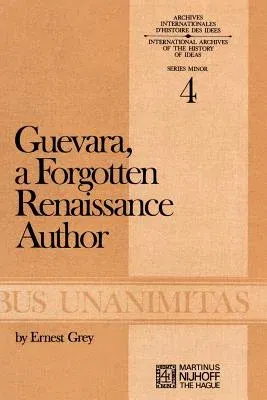A S Grey
(Author)Guevara, a Forgotten Renaissance Author (1973)Paperback - 1973, 31 July 1973

Qty
1
Turbo
Ships in 2 - 3 days
In Stock
Free Delivery
Cash on Delivery
15 Days
Free Returns
Secure Checkout
Part of Series
Archives Internationales D'Histoire Des Idées Minor
Part of Series
NATO Asi Series. Series E, Applied Sciences
Part of Series
Archives Internationales D'Histoire Des Idees Minor
Part of Series
Archives Internationales D'Histoire Des Id??es Minor
Part of Series
Archives Internationales D'Histoire Des Id?es Minor
Part of Series
Archives Internationales D'Histoire Des Ida(c)Es Minor
Part of Series
Archives Internationales D'Histoire Des Id Es Minor
Print Length
147 pages
Language
English
Publisher
Springer
Date Published
31 Jul 1973
ISBN-10
9024751551
ISBN-13
9789024751556
Description
Product Details
Author:
Book Edition:
1973
Book Format:
Paperback
Country of Origin:
US
Date Published:
31 July 1973
Dimensions:
23.39 x
15.6 x
0.84 cm
ISBN-10:
9024751551
ISBN-13:
9789024751556
Language:
English
Location:
Dordrecht
Pages:
147
Publisher:
Series:
Archives Internationales D'Histoire Des Idées MinorNATO Asi Series. Series E, Applied SciencesArchives Internationales D'Histoire Des Idees MinorArchives Internationales D'Histoire Des Id??es MinorArchives Internationales D'Histoire Des Id?es MinorArchives Internationales D'Histoire Des Ida(c)Es MinorArchives Internationales D'Histoire Des Id Es Minor
Weight:
222.26 gm

